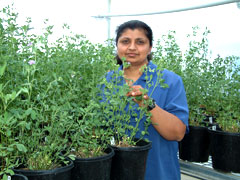
New face for state's lucerne breeding program

NSW Department of Primary Industries (DPI) has appointed Dr Shoba Venkatanagappa to head the state’s lucerne breeding program at the Tamworth Agricultural Institute.
Deputy Director-General (Science and Research), Nick Austin said Dr Venkatanagappa would bring some 12 years experience as a plant breeder to the role.
“Dr Venkatanagappa has had extensive experience at the University of Sydney, the Department of Primary Industries Victoria and with multinational private industry,” Dr Austin said.
“For the past five and a half years she has been the NSW DPI’s barley breeder at Wagga Wagga and her specialised knowledge of molecular breeding will now be applied to lucerne breeding.
“Her appointment will add value to the work carried out by her predecessor Dr Rex Williams and enhance the skills that already exist in the breeding team.
“I am confident that growers can expect to see further significant developments with lucerne breeding in the near future.”
NSW DPI’s lucerne breeding program at Tamworth has bred many successful varieties, including 'Aurora', 'Aquarius', 'Genesis’ ‘Venus’ and ‘Pegasis’.
Dr Venkatanagappa said she was looking forward to building on that success, and the challenge of guiding the future expansion of lucerne in Australia.
“Lucerne is a key component of sustainable cropping and grazing systems and farmers will continue to seek improved varieties,” she said.
“There’s a huge potential and support for lucerne to expand in Australia. This is being fuelled by demand, particularly from producers in NSW who are looking for alternatives.
“Apart from its traditional role for both forage and grazing, lucerne hangs on in drought – this becomes even more important in a time of climate change.”
Dr Venkatanagappa said the lucerne breeding alliance (made up of NSW DPI, University of Queensland, the Grains Research and Development Corporation and Seedmark) had encouraged her to adopt a long-term vision for the lucerne breeding program.
She said growers could look forward to new varieties with improved agronomic performance as well as breakthroughs with improved tolerance of soil acidity and salinity.
“Growers can also expect to see the application of the latest breeding technology which will come into the DPI lucerne breeding program through collaboration with The University of Queensland, Queensland DPI and Fisheries, SARDI, and international linkages,” she said.
“A special feature of DPI’s lucerne breeding program will be the development of technology packages for any new release to ensure that growers can get the best out of the new varieties.”
Dr Venkatanagappa can be contacted at NSW DPI’s Tamworth Agricultural Institute, telephone (02) 6763 1205.
Email:

